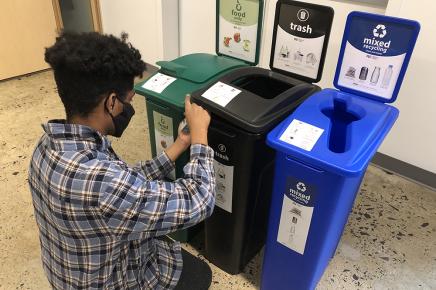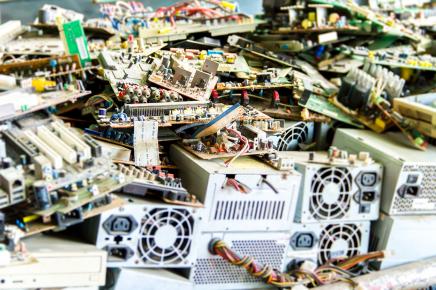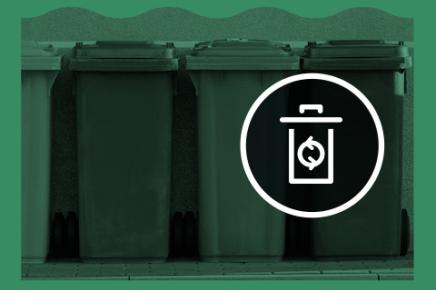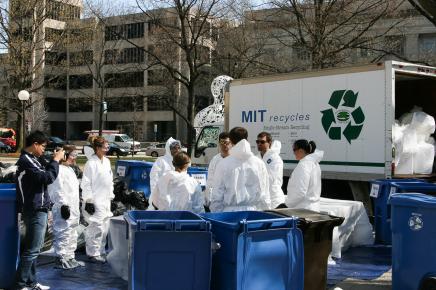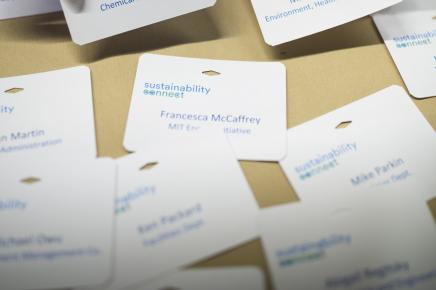Through a number of sites, MIT seeks to re-imagine its waste management systems and behaviors in order to safely eliminate waste generation and drive a circular flow of materials from inputs through outputs, procurement through disposal.
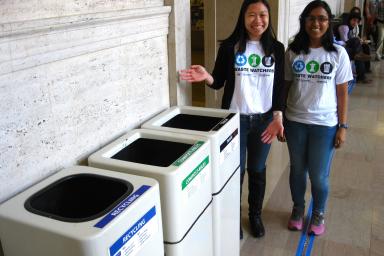
When we hear “waste reduction,” we tend to think about reducing our contributions to the landfill or incinerator, but waste reduction is a more complex and far-reaching story. The collection, transportation, and disposal of waste have tremendous economic and environmental impacts on our communities. Waste is also a public-health issue and a quality-of-life issue.
At the MIT Office of Sustainability (MITOS), we are working with our campus operational partners; departments, labs, and centers; material scientists, behavioral researchers and MIT's waste hauler to design and test strategies that reduce the generation of trash and increase the amount of clean material (i.e. paper goods, plastics, and food waste) that can be recycled and re-processed. (Learn how a partnership with the MIT Media Lab offered actionable ideas and data on waste reduction)
Diverting waste from landfills and incineration can reduce air, water, and soil pollution, decrease emissions, recover and repurpose valuable materials, and compost and redirect surplus food. We're seeking to collect and organize data from campus waste audits to inform efforts to design out waste including the East Campus Food Waste Pilot.
Strategies
Here are just a few of the waste reduction strategies we’re exploring:
-
reduce or eliminate campus waste at or near the source of generation
-
promote use of re-usable goods in place of single-use items
-
grow a visible and accessible online marketplace for re-use of surplus materials
-
develop guidelines for purchasing materials that are made from renewable resources
-
evaluate and factor in the lifecycle of materials during the purchasing process
-
increase the diversion rate of campus waste through reuse, recycling, and processing of organic materials
-
test different strategies for communicating, collecting, handling and hauling waste materials
MITOS is currently working collaboratively to design out waste and contamination of recyclable materials via operations, education, research and innovation in the following areas.
Through a partnership with the Environmental Solutions Initiative and the Vice President for Finance (VPF) this collaborative analysis asks the question: How can MIT optimize material flows and reduce its negative impacts through innovations in purchasing, consumption and disposal processes?
MITOS has partnered with the Office of Recycling and Materials Management to develop an open-source tracking and reporting tool called Materials Matters that reports the volume of 20 different recycling and solid waste outputs collected and transported from MIT on a monthly and yearly basis since 2011.
In recent years, the Office of Sustainability, in partnership with the Department of Facilities and other Institute departments, labs, and centers, has worked to pilot a number of studies focused on waste disposal practices and specifically waste stream contamination.
Designing out waste and driving a circular economy on a university campus: a complex, multi solution approach The MIT Office of Sustainability (MITOS) is committed to designing out waste from a campus of 168 urban acres and nearly 170 buildings.
This Certification helps guide planners toward making smart choices about food, energy, transportation, and materials when planning an event at MIT.
MITOS is part of a community of departments, labs, and centers working toward elements of a sustainable campus. Featured below are initiatives from some of our partners.

Free gently used goods exchange held on the third Thursday of the month in the Stata Center lobby.
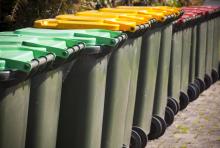
This introductory course focuses on understanding some of the multiple dimensions of the global waste system.
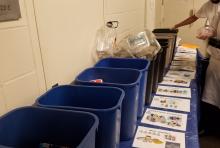
Online course developed by the MIT GSC Sustainability Committee to help answer questions about what goes where in the waste streams at MIT.
Works with administrative and student groups to increase the amount of recycled goods and the types of materials that can be recycled.
Works to develop and practice the most efficient methods of buying products and services for the MIT community.
Works with undergrads, faculty and administration to introduce and improve sustainable programs on campus.
Cultivates sustainable behaviors and systems in the graduate community and throughout MIT.
Channels MIT’s unique culture to create solutions to environmental challenges through activities in education, research, and convening.
Fosters a forum where students, industrial practitioners, and policy makers can discuss waste-sector issues and innovations.



